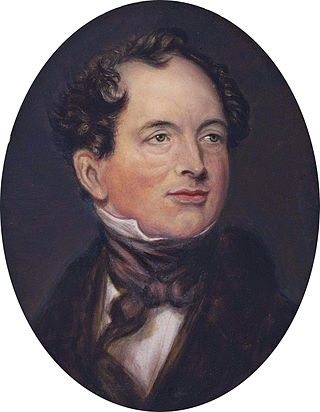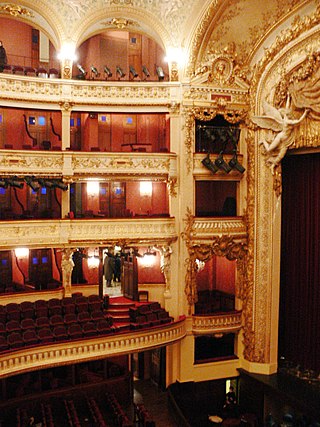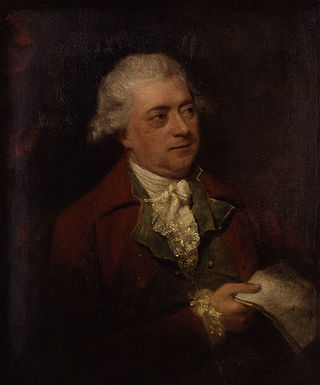
Wilhelm Richard Wagner was a German composer, theatre director, polemicist, and conductor who is chiefly known for his operas. Unlike most opera composers, Wagner wrote both the libretto and the music for each of his stage works. Initially establishing his reputation as a composer of works in the romantic vein of Carl Maria von Weber and Giacomo Meyerbeer, Wagner revolutionised opera through his concept of the Gesamtkunstwerk, by which he sought to synthesise the poetic, visual, musical and dramatic arts, with music subsidiary to drama. He described this vision in a series of essays published between 1849 and 1852. Wagner realised these ideas most fully in the first half of the four-opera cycle Der Ring des Nibelungen.

Thomas Moore, also known as Tom Moore, was an Irish writer, poet, and lyricist celebrated for his Irish Melodies. His setting of English-language verse to old Irish tunes marked the transition in popular Irish culture from Irish to English. Politically, Moore was recognised in England as a press, or "squib", writer for the aristocratic Whigs; in Ireland he was accounted a Catholic patriot.

The Rite of Spring is a ballet and orchestral concert work by the Russian composer Igor Stravinsky. It was written for the 1913 Paris season of Sergei Diaghilev's Ballets Russes company; the original choreography was by Vaslav Nijinsky with stage designs and costumes by Nicholas Roerich. When first performed at the Théâtre des Champs-Élysées on 29 May 1913, the avant-garde nature of the music and choreography caused a sensation. Many have called the first-night reaction a "riot" or "near-riot", though this wording did not come about until reviews of later performances in 1924, over a decade later. Although designed as a work for the stage, with specific passages accompanying characters and action, the music achieved equal if not greater recognition as a concert piece and is widely considered to be one of the most influential musical works of the 20th century.

Johann Christian Bach was a German composer of the Classical era, the eighteenth child of Johann Sebastian Bach, and the youngest of his eleven sons. After living in Italy for five years (1757–1762), Bach moved to London, where he became known as "The London Bach". He is also sometimes known as "The English Bach", and during his time spent living in the British capital, he came to be known as John Bach. He is noted for playing a role in influencing the concerto styles of Haydn and Mozart. He contributed significantly to the development of the new sonata principle.

Jules Émile Frédéric Massenet was a French composer of the Romantic era best known for his operas, of which he wrote more than thirty. The two most frequently staged are Manon (1884) and Werther (1892). He also composed oratorios, ballets, orchestral works, incidental music, piano pieces, songs and other music.

Tom Berenger is an American actor. He was nominated for the Academy Award for Best Supporting Actor for his portrayal of the Staff Sergeant Bob Barnes in Platoon (1986). He is also known for playing Jake Taylor in the Major League films and Thomas Beckett in the Sniper films. Other films he appeared in include Looking for Mr. Goodbar (1977), The Dogs of War (1980), The Big Chill (1983), Eddie and the Cruisers (1983), Someone to Watch Over Me (1987), Betrayed (1988), The Field (1990), Sniper (1992), Gettysburg (1993), The Substitute (1996), Training Day (2001), and Inception (2010).
The history of opera in the English language commences in the 17th century.

The Opéra-Comique is a Paris opera company which was founded around 1714 by some of the popular theatres of the Parisian fairs. In 1762 the company was merged with – and for a time took the name of – its chief rival, the Comédie-Italienne at the Hôtel de Bourgogne. It was also called the Théâtre-Italien up to about 1793, when it again became most commonly known as the Opéra-Comique. Today the company's official name is Théâtre national de l'Opéra-Comique, and its theatre, with a capacity of around 1,248 seats, sometimes referred to as the Salle Favart, is located at Place Boïeldieu in the 2nd arrondissement of Paris, not far from the Palais Garnier, one of the theatres of the Paris Opéra. The musicians and others associated with the Opéra-Comique have made important contributions to operatic history and tradition in France and to French opera. Its current mission is to reconnect with its history and discover its unique repertoire to ensure production and dissemination of operas for the wider public. Mainstays of the repertory at the Opéra-Comique during its history have included the following works which have each been performed more than 1,000 times by the company: Cavalleria Rusticana, Le chalet, La dame blanche, Le domino noir, La fille du régiment, Lakmé, Manon, Mignon, Les noces de Jeannette, Le pré aux clercs, Tosca, La bohème, Werther and Carmen, the last having been performed more than 2,500 times.

Rusalka, Op. 114, is a 1901 opera by Antonín Dvořák. The Czech libretto was written by the poet Jaroslav Kvapil (1868–1950) based on the fairy tales of Karel Jaromír Erben and Božena Němcová. A rusalka is a water sprite from Slavic mythology, usually inhabiting a lake or river. Rusalka was the ninth opera Dvořák composed. It is Dvořák's most successful opera and belongs to the repertoire of all world opera scenes.

Dido and Aeneas is an opera in a prologue and three acts, written by the English Baroque composer Henry Purcell with a libretto by Nahum Tate. The dates of the composition and first performance of the opera are uncertain. It was composed no later than July 1688, and had been performed at Josias Priest's girls' school in London by the end of 1689. Some scholars argue for a date of composition as early as 1683. The story is based on Book IV of Virgil's Aeneid. It recounts the love of Dido, Queen of Carthage, for the Trojan hero Aeneas, and her despair when he abandons her. A monumental work in Baroque opera, Dido and Aeneas is remembered as one of Purcell's foremost theatrical works. It was also Purcell's only true opera, as well as his only all-sung dramatic work. One of the earliest known English operas, it owes much to John Blow's Venus and Adonis, both in structure and in overall effect.

John O'Keeffe was an Irish actor and dramatist. He wrote a number of farces, amusing dramatic pieces and librettos for pasticcio operas, many of which had great success. Among these are Tony Lumpkin in Town (1778), Love in a Camp (1786), and Omai (1785), an account of the voyages of the Tahitian explorer Omai, and Wild Oats (1791).

Michael Kelly was an Irish tenor, composer and theatrical manager who made an international career of importance in musical history. One of the leading figures in British musical theatre around the turn of the nineteenth century, he was a close associate of playwright and poet Richard Brinsley Sheridan. He also became friends with musicians such as Mozart and Paisiello, and created roles for the operas of both composers. With his friend and fellow singer Nancy Storace, he was one of the first tenors of that era from Britain and Ireland to become famous in Italy and Austria. In Italy he was also known as O'Kelly or even Signor Ochelli. Although the primary source for his life is his Reminiscences, doubt has been cast on the reliability of his own account, and it has been said that '[a]ny statement of Kelly's is immediately suspect.'

AnnaSelina Storace, known professionally as Nancy Storace, was an English operatic soprano. The role of Susanna in Mozart's Le nozze di Figaro was written for and first performed by her.

Brigida Banti, best known by her husband's surname and her stage-name, as Brigida Banti, was an Italian soprano.
The Gypsy Prince is a comic opera with a libretto by Thomas Moore and the music written in collaboration between Moore and Michael Kelly.
M. P., or The Blue Stocking is an 1811 comic opera in three acts with a libretto by Thomas Moore and music written in collaboration between Moore and Charles Edward Horn (1786–1849). It was first staged at the Lyceum Theatre on 9 September 1811 under the directorship of Samuel James Arnold. The vocal score was published in London by J. Power (1811) and in New York by The Longworths (1812).
Richard Coeur de Lion: An historical romance is a 1786 semi-opera with an English text by John Burgoyne set to music by Thomas Linley the Elder. It was first staged at Drury Lane Theatre in October 1786. It was a translation of Michel-Jean Sedaine's opera Richard Coeur-de-lion about the life of the English Monarch Richard I with the ending significantly changed. The work was a major success and ran for 43 performances and was revived seven times before the end of the century. By contrast a rival version staged at the Covent Garden Theatre at the same time was a failure.
Tonio di Paolo is an American opera singer. He began his career in the 1970s as a baritone but since the late 1970s has portrayed roles as a leading tenor. His performance credits include appearances with the Metropolitan Opera, the Lyric Opera of Chicago, the San Francisco Opera, the Houston Grand Opera, the Canadian Opera Company, and the Hamburg State Opera among other companies. He has created roles in the world premieres of operas by composers Samuel Adler, David Carlson, John Harbison, and Augusta Read Thomas. He retired from the stage in 2010.
Robert Houlton (c.1739–1815) was an English medical practitioner, dramatist and journalist.
Joyce Mathis was an American soprano who was a concert artist, recitalist, and opera singer from the 1960s into the early 1990s. She is considered a part of the first generation of black classical singers to achieve success in the United States; breaking down racial barriers within the field of classical music. She won several notable singing competitions, including the Marian Anderson Award in 1967 and the Young Concert Artists in 1968. In 1970 she recorded the role of the High Priestess in Verdi's Aida alongside Leontyne Price and Placido Domingo. Pulitzer Prize-winning composer Ned Rorem wrote his song cycle Women's Voices for her in 1975. In 1976 she created the role of Celestina in Roger Ames's opera Amistad at the Kennedy Center for the Performing Arts. She appeared frequently in performances with Opera Ebony and the Boys Choir of Harlem in addition to touring widely as a recitalist and concert soprano.














